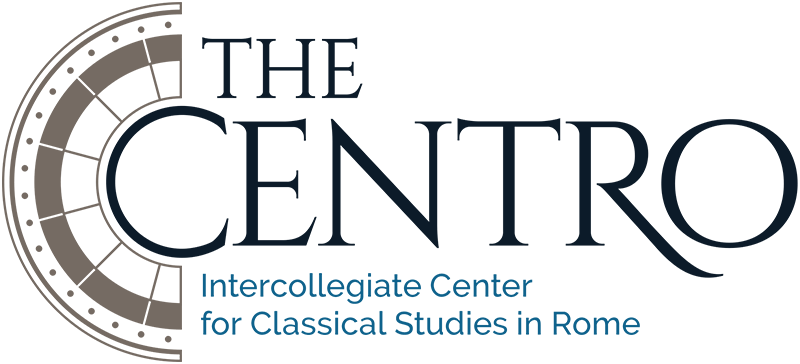With Rome as their classroom, Centro students encounter the marvels and the markets; the arenas and the alleyways; the domes, the details, and everything in between.
The Ancient City
The heart of the Centro curriculum is The Ancient City, a double-credit course required of all Centristi. This interdisciplinary class tackles Rome’s art, history, archaeology, topography, social make-up, and much more. The Professor-in-Charge heads up the course, and all Centro faculty lend their expertise to this joint endeavor.
Over the course of a typical week, Centristi dedicate two half-days and one full day to The Ancient City. Almost all class meetings unfold on archaeological sites, in museums, and amid standing remains. Daylong excursions to Rome’s neighboring cities and sites round out the picture of Rome’s growth from a clutch of huts on a hill to the head of a Mediterranean-spanning empire.
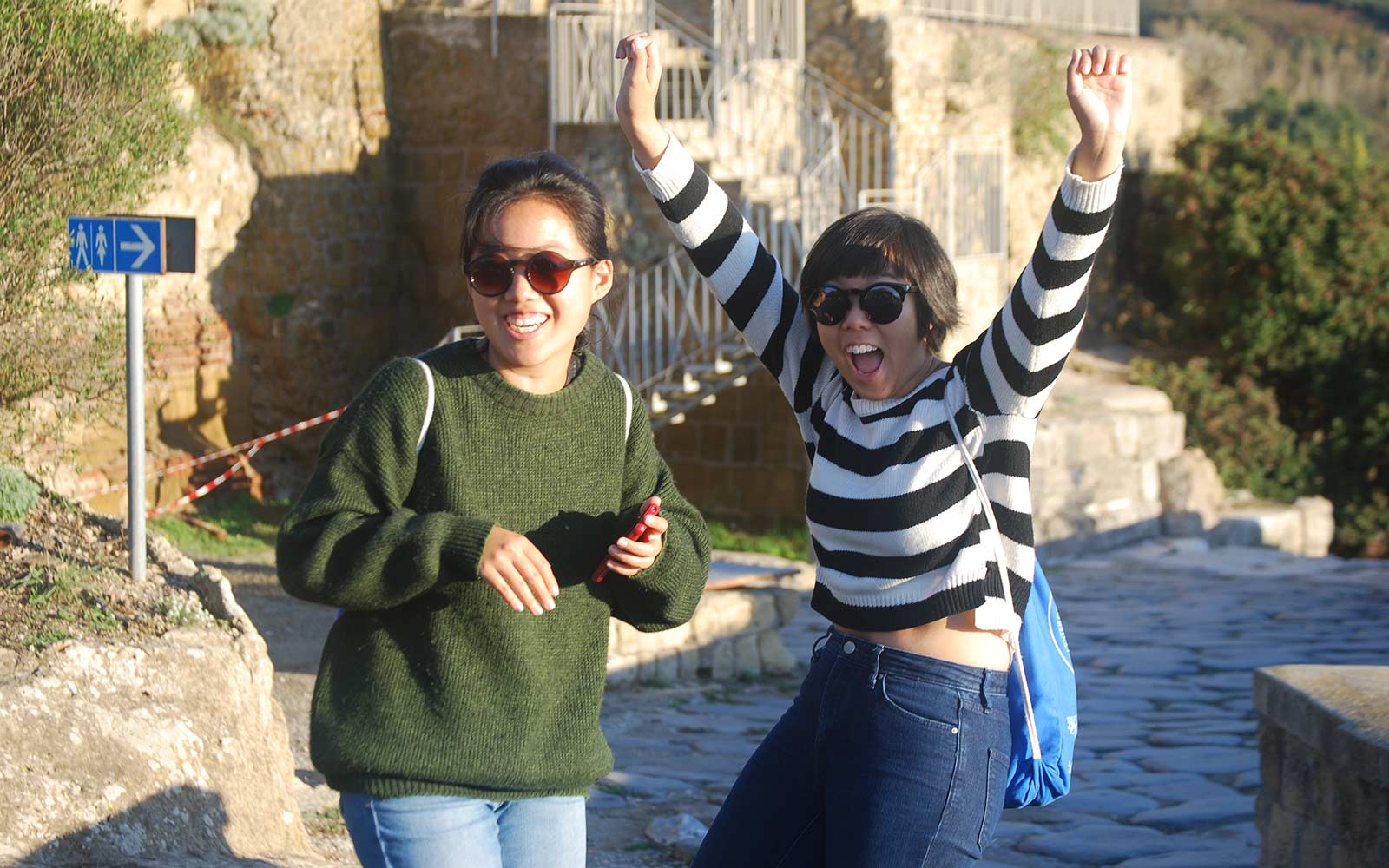
Additionally, throughout the term, the Centro hits the road for longer excursions: to the Bay of Naples and elsewhere throughout Roman lands, such as Sicily, stunning sites in Northern Italy, colonial cities in Southern France or other spots as chosen by the faculty. Thanks to these trips, The Ancient City touches on Etruscan, Greek, Roman, and native Italian (and even Gallic) populations, their interactions, and mutual influence. While the course focuses on Rome, a rich picture of the city’s broader context emerges as The Ancient City unfolds.
What can you expect from The Ancient City? Stand where Cicero delivered speeches in the Forum Romanum. Descend into subterranean shrines to the mystery cult of Mithras. Learn about the self-identities of former enslaved peoples along the Via Appia. Contrast the grand reception rooms of sprawling villas with the cramped kitchens and narrow hallways of urban apartments at Pompeii, Ostia, and Herculaneum.
Check out some syllabi for “The Ancient City” from recent years.
“I wanted to see Italy, but I didn’t want to compromise my rigorous academic schedule... The Centro was the perfect fit, and it is an honor to be a Centrista.”
– Grace McIntire, Randolph-Macon College
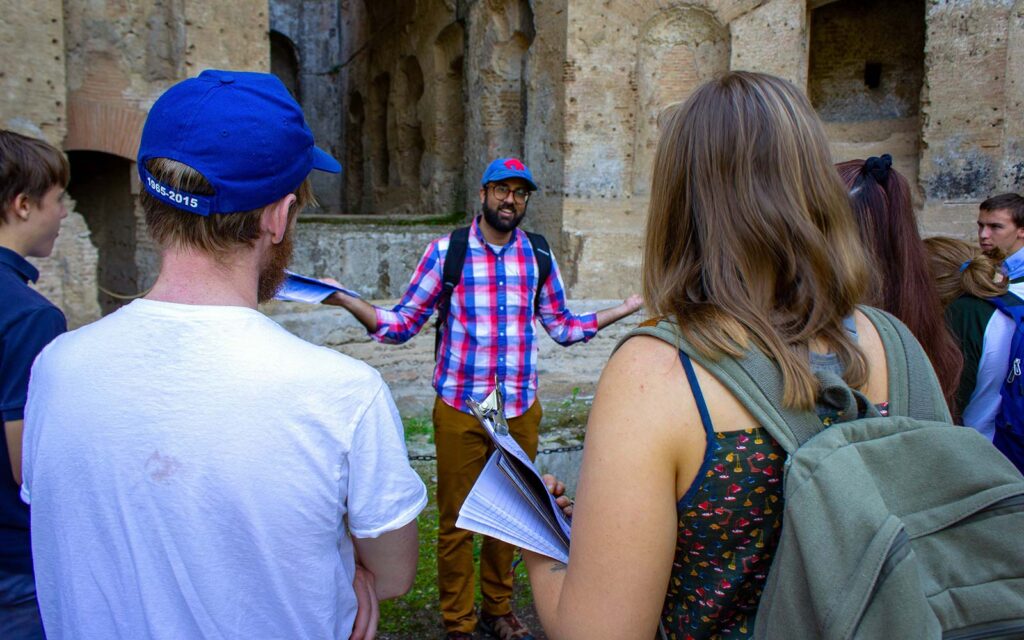
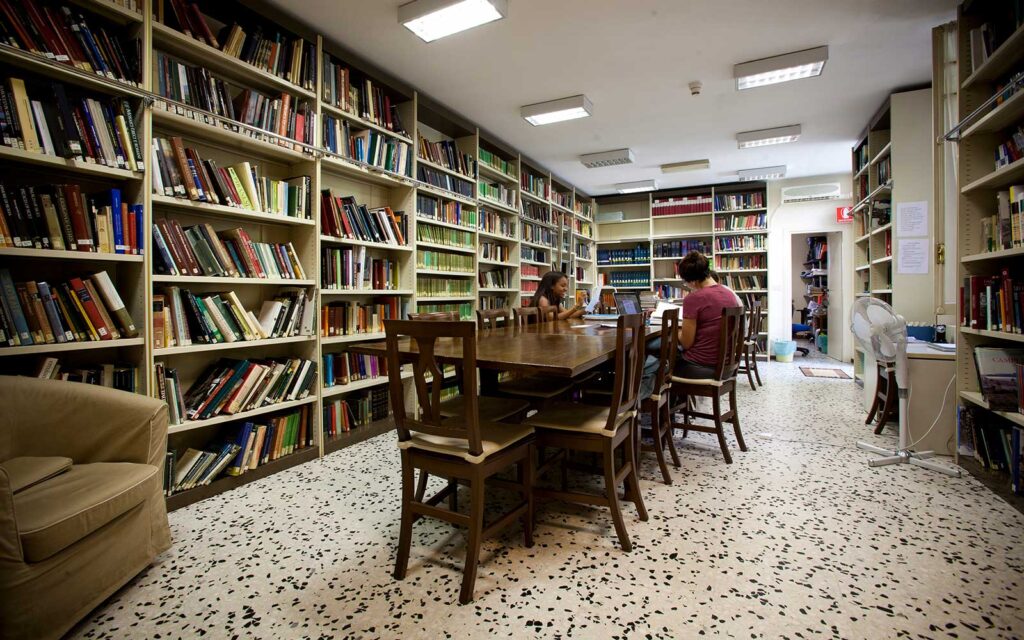
Other Courses
All Centro classes involve learning by doing – studying paintings and sculpture in the manner they were intended to be displayed; examining the elements’ effect on standing architecture; or performing your own adaptation of a Greek play in an ancient theater. Centristi completely soak in and take full advantage of all that Rome and Italy have to offer.
Many Centristi enroll in Ancient Greek and/or Latin at the intermediate or advanced level. Every year, faculty members select texts that suit their personal expertise, that come to life while being read on site in Rome, and that usually avoid commonly-read works. That way, all students are encountering a text in a new way. Where better to read the Res Gestae, for instance, than in the city that Augustus transformed from brick to marble?
Courses in the past have explored literary inscriptions, Greek authors’ visions of Rome, Latin authors’ conceptions of urban space, Aeneid 8, Plutarch’s Life of Anthony, and other topics.
There is no ancient language requirement at the Centro; students are welcome to take as many or as few Greek and Latin courses as they’d like. These courses are each taught by one of the four Centro professors.
Renaissance and Baroque Art History grants Centristi the opportunity to explore another stratum of the Eternal City head-on and in-person. Learn about greats of the Italian artistic pantheon – Michelangelo, Raphael, Caravaggio, Bernini, and others – by seeing their masterpieces in Rome’s churches, museums, and palazzi. This course is taught by Paul Tegmeyer.
Conservation and Management of the Material Heritage of Ancient Rome grants Centristi the opportunity to learn about and also to try their hand at the preservation of Rome’s physical remains. Thanks to deep connections in the field of conservation, Centristi in recent years have visited on-going excavations to witness in situ technical operations. Meanwhile, back at the Centro’s temporary laboratory, they use ancient techniques to construct their own mosaics. This course is taught by Roberto Nardi.
Buongiorno! Centristi in Elementary Italian learn basic grammar, morphology, and vocabulary of the language. Special emphasis concentrates on oral skills that are helpful in navigating contemporary life in Rome and Italy. This course is taught by Barbara Castaldo.
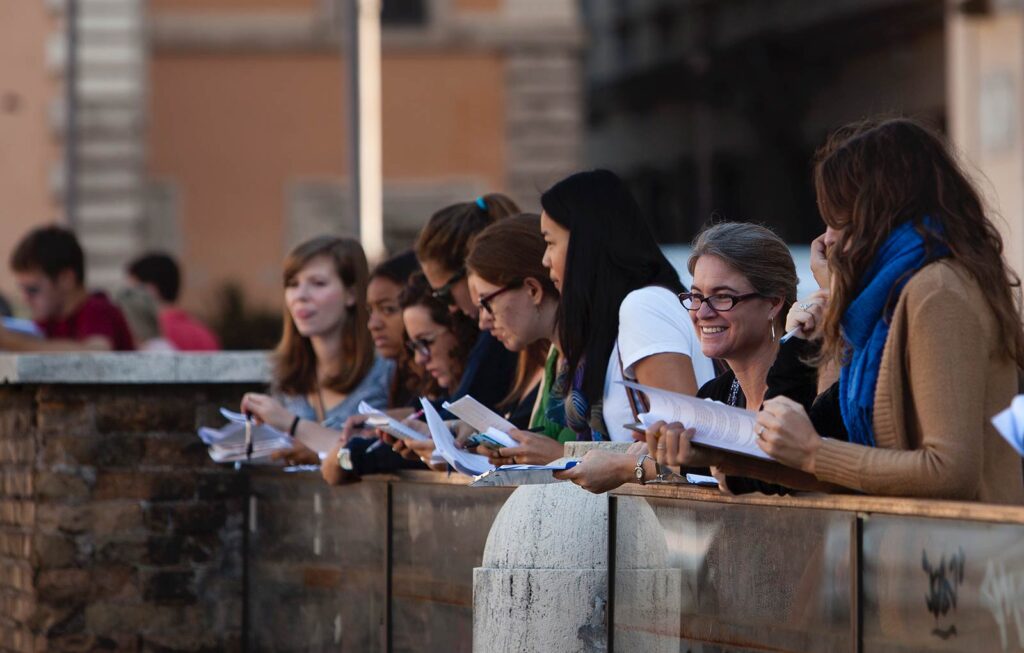
Which courses should I take? Are you…
- …in love with the Classics?
- Consider pairing The Ancient City with the appropriate levels of Greek and Latin.
- …someone who can’t get enough art history?
- Think about The Ancient City, Art History, and Italian.
- …into museum studies?
- Dive into The Ancient City, Art History, and Conservation.
- …curious about the history of Rome through the ages?
- Deepen your knowledge with The Ancient City, a course in Latin, and Art History.
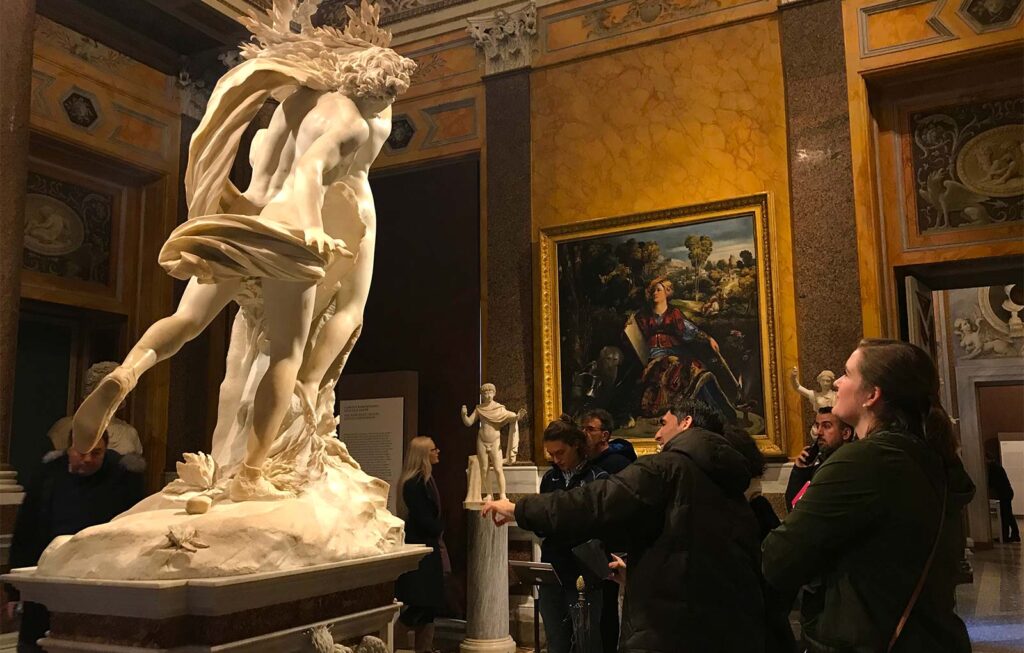
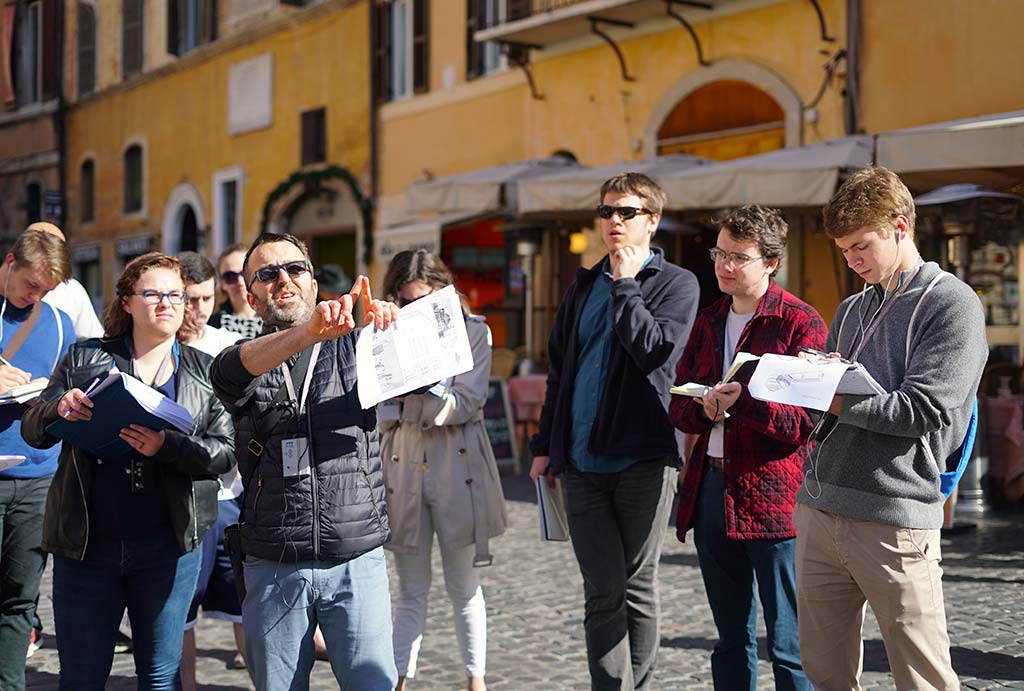
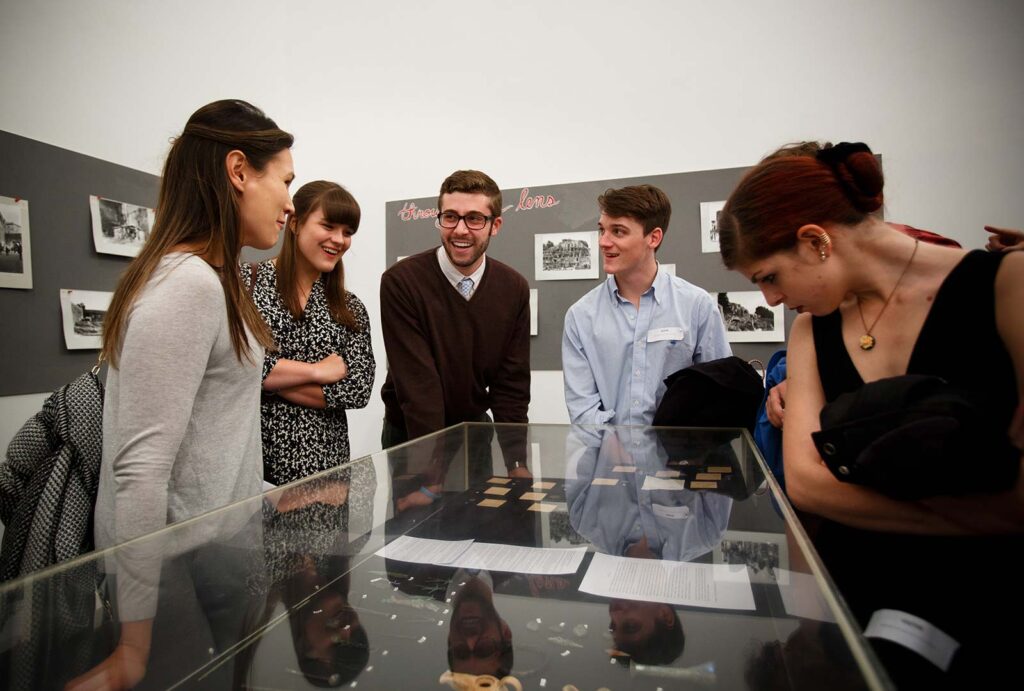
Faculty
Each academic year, the Centro selects four professors from posts at premier institutions across the US and Canada to lead the program. Many are former Centristi themselves; all are lovers of Rome who are excited to engage with dedicated students of the ancient world. As true Romanophiles, faculty look to the mos maiorum and honor many past traditions when crafting a syllabus. Since new faculty arrive each year, they bring their own ideas and both draw on and contribute to the program’s energy. Accordingly, the Centro’s curriculum is constantly refreshed and tailored to suit the talents and expertise of each year’s professors. It’s a bit like a jazz concert – the standards all get played, but every faculty cohort adds their own vibe.
To round out the teaching team, three Italy-based faculty lend their expertise on Italian, Renaissance and Baroque Art History, and Conservation.
2025-2026 Faculty Cohort
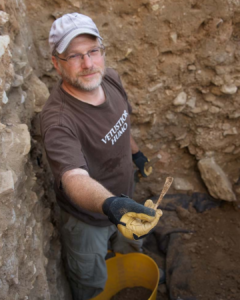
Andrew Goldman is a Professor in the Department of History at Gonzaga University in Spokane, WA. He received his BA in Classical Civilizations from Wesleyan University before attending the University of North Carolina, Chapel Hill, where he completed both his MA and doctorate in Classical Archaeology. Goldman has been a team member of numerous archaeological field projects in Turkey, Sicily, and Cyprus, including fieldwork at the early Neolithic settlement of Çatal Höyuk. While he concentrates primarily upon the investigation of ancient Roman material culture, his academic interests vary widely, from the study of small, mundane objects like carved gemstones and what they can tell us about Roman-period culture, to addressing broader questions which span the topics of war and death in the Roman Republic and Empire, through the examination of battle sites, military camps and cemeteries. During his career he has directed the excavation of a Roman imperial military base at ancient Gordion in central Turkey, and currently he is the field director of the Sinop Regional Archaeological Project (SRAP), an international team investigating the Archaic Greek colony and pre-colonial settlement at ancient Sinope, on the northern Black Sea coast of Turkey. Previously he has been both an undergraduate at the Intercollegiate Center for Classical Studies in Rome (Spring 1987) and a faculty member for the 1999-2000 academic year. Since that time he has designed and led numerous study abroad programs for the Vergilian Society and his home university, with themes that range from ancient mythology and sanctuaries to following in the footsteps of Alexander the Great. Goldman has published numerous articles about aspects of his fieldwork in scholarly and popular journals such as Anatolian Studies, Expedition, and the Journal of Roman Archaeology, and he is co-author with C. Gates of the forthcoming 3rd edition of Ancient Cities (Routledge, 2023). For the past fifteen years decade he has traveled across the U.S. as a frequent national lecturer for local societies of the Archaeological Institute of America, as well as proudly serving as president of the Spokane Society of the AIA for over a decade.
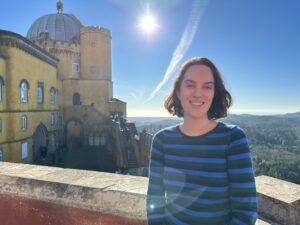
Jenni Glaser recently defended her PhD dissertation on Lucian and Old Comedy at Bryn Mawr College and currently teaches Classics at Temple University. She has taught intensive summer courses in Rome for many years and conducted research in manuscripts at the Vatican Library and the University of Oxford, where she was recently a visiting researcher. Her interests range widely within Greek and Latin literature. In addition to her work on Old Comedy, Plato, and Imperial Greek, she has published on Aeschylus’ tragedies and presented papers on Pindar, Seneca’s tragedies, Lucretius, and Lucian’s Early Modern reception. Jenni is delighted to return to Italy and share the many ways that the city of Rome brings the words of Greek and Latin literature to life, as well as to share her hard-won expertise in knowing the best gelato spot for every neighborhood in Rome.
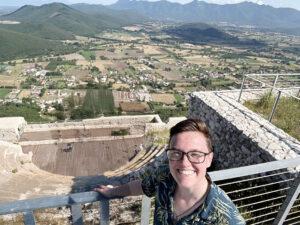
Mac Carley is a Roman social historian whose work focuses on ancient drama, identity and religion through the lens of space and spatial theory. He earned a bachelor’s degree from Stanford University and worked in Rome as a classical tour guide and instructor at the Paideia Institute. Mac is currently completing a PhD in classics at Brown University, where he has taught courses in Latin and ancient Greek as well as ancient history and material culture. Other specific interests include epigraphy, classical reception, and Red Sox baseball.
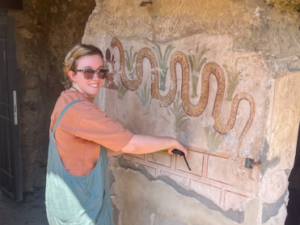
Cesca LaPasta is a PhD candidate in Classical Archaeology at the University of California, Berkeley. She studied at the Centro in the Spring of 2018 while earning her degree at Cornell University. Before her interdisciplinary interests pulled her towards archaeology, she completed an MA in Latin literature at Berkeley. Cesca’s research focuses on slavery in Ancient Rome and accessing the lived experience of marginalized people in the past through material culture. Recently, she has been exploring the intersection of slavery and security in domestic contexts, which is the subject of her dissertation. This interest grew out of her many years working at Pompeii as part of the Pompeii Artifact Life History Project. Along with her research, she is passionate about bringing challenging conversations into the classroom that inspire students to consider the perspectives of non-elites alongside the fascinating texts and beautiful objects that have traditionally been the focus of a Classical education. Living up to her name, Cesca is looking forward to all the delicious food she’ll be eating while in Italy. You might also catch her practicing her rollerskating in the backyard of the Centro (or out and about in the city if she gets brave enough).
Italian Language Instructor
Barbara Castaldo (Laurea, Università La Sapienza di Roma; M.A., Columbia University; Ph.D., New York University) is specialized in contemporary Italian literature with a doctoral thesis on Italian author Pier Paolo Pasolini (awarded Premio Pasolini in 2009). Her research interests include law and literature scholarship and comparative literature. She has published articles on contemporary Italian authors (Sandro Veronesi, Marco Lodoli, Ennio Flaiano, Pier Paolo Pasolini), and has appeared in a number of TV documentaries and radio interviews for Rai Storia (Italy), Arte TV (France-Germany), Österreich 1 (Austria). She is currently working on a book on Pier Paolo Pasolini’s legal trials. She has taught courses of Italian language at all levels and has been teaching Italian at ICCS since 2005.
Art History Instructor
Paul Tegmeyer began studying art history as an undergraduate at New Mexico State University in Las Cruces, New Mexico, where he was raised. After moving to Italy, actually l’Aquila, outside Rome, in 1983, he began graduate school at Temple University in Rome, and then Philadelphia. He later entered the Ph.D. program at the University of Pennsylvania. His area of specialization is the Italian Renaissance.
He began teaching the Renaissance. to Baroque Rome course at ICCS from 1990-92 and again from 1997 on. He also been teaching at John Cabot University in Rome since 1991. Here he has had the opportunity to expand his repertoire beyond the Italian Renaissance, teaching courses on Ancient and Medieval Rome, Baroque art, as well as monographic courses on Renaissance Rome; Raphael; Michelangelo; Bernini; et al. Since 1997 he has also conducted the Rome Seminar for the Smithsonian Institute.
His research focuses primarily on various aspects of Roman Renaissance art (Raphael, Pollaiuolo, Michelangelo, et al.). He is also now in the early stages of preparing with other colleagues, a “Guide to Renaissance Rome”.
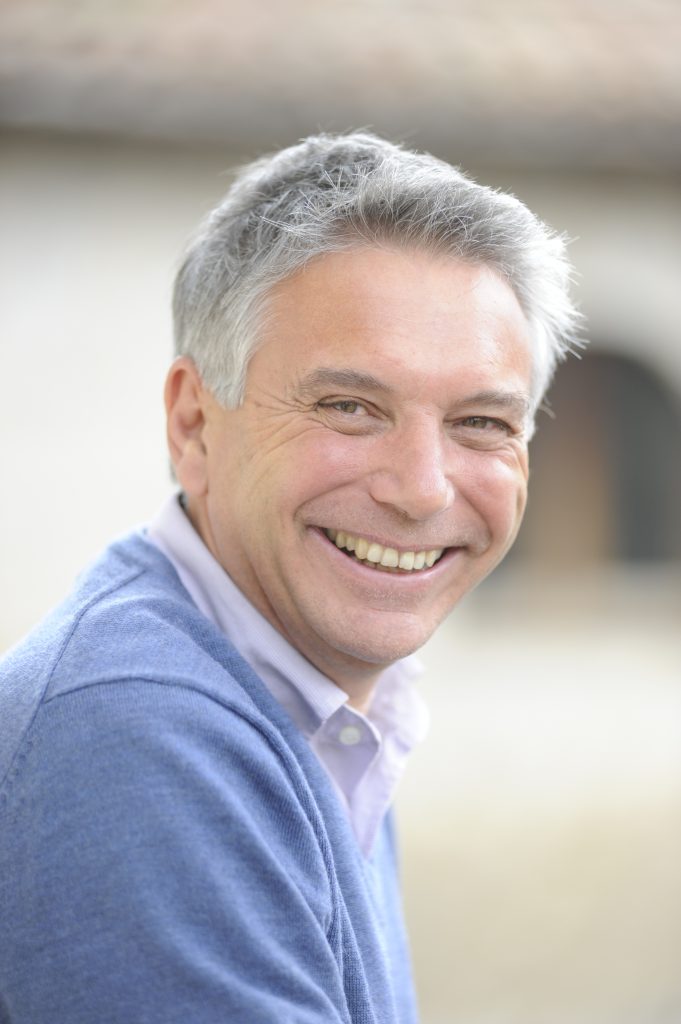
Roberto Nardi gained a degree in archaeology from the University of Rome La Sapienza in 1982, and a degree in conservation of archaeological materials and structures at ICR – Istituto Centrale per il Restauro, where he specialized in stone conservation in 1982.
In the same year, he founded the Centro di Conservazione Archeologica (CCA), a private company operating on public commission in the field of conservation of ancient monuments and archaeological sites, including professional training in conservation.
He has directed over 50 projects in 10 countries, on monuments and sites such as the Arch of Septimius Severus and the Temple of Vespasian in the Roman Forum, the Roman town of Zeugma, Turkey, the mural paintings of the Madrasa Amiriya in Yemen, and the mosaics of Saint Catherine in Sinai. Roberto has published over 80 technical articles, being co-editor of 7 volumes on conservation.
He is President of the ICCM, International Committee for the Conservation of Mosaics and member of ICOM, International Council of Museums – Committee for Conservation. He was Kress Lecturer at the American Institute of Archaeology for the academic years 2010/2011.
2024-2025 Faculty Cohort
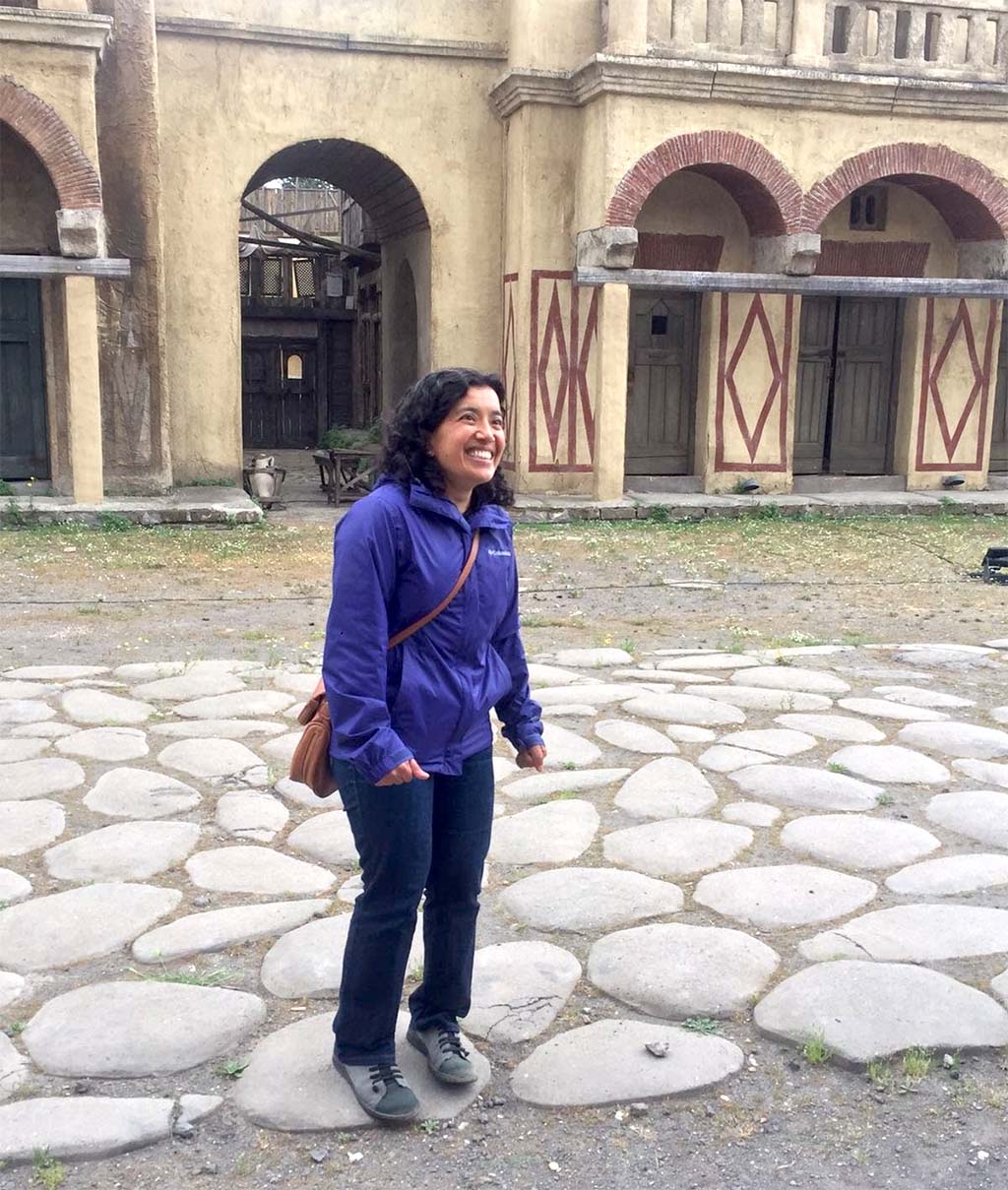
Sonia Sabnis is Professor of Greek, Latin, and Ancient Mediterranean Studies and Humanities at Reed College, where she has taught since 2006. She studied at the Centro during the Fall 1996 semester and received her BA from Columbia University before completing an MA and Ph.D. at University of California, Berkeley. She is broadly interested in imperial literature, Greek and Latin, but her primary research specialty is the African Roman author Apuleius. Her published research includes studies of slavery and literature, figurative katabasis, and reception in different contexts in the twentieth and twenty-first centuries, such as contemporary Algerian novels, horror, and poetry in English. Prof. Sabnis was Associate Professor at the Centro in 2017–2018 and has held research fellowships at Vassar College, Wellesley College, and the W. E. B. Du Bois Center at the University of Massachusetts. Her love for mentoring students and undergraduate research extends to her current role as a mentor through the Asian and Asian American Classical Caucus (AAACC).
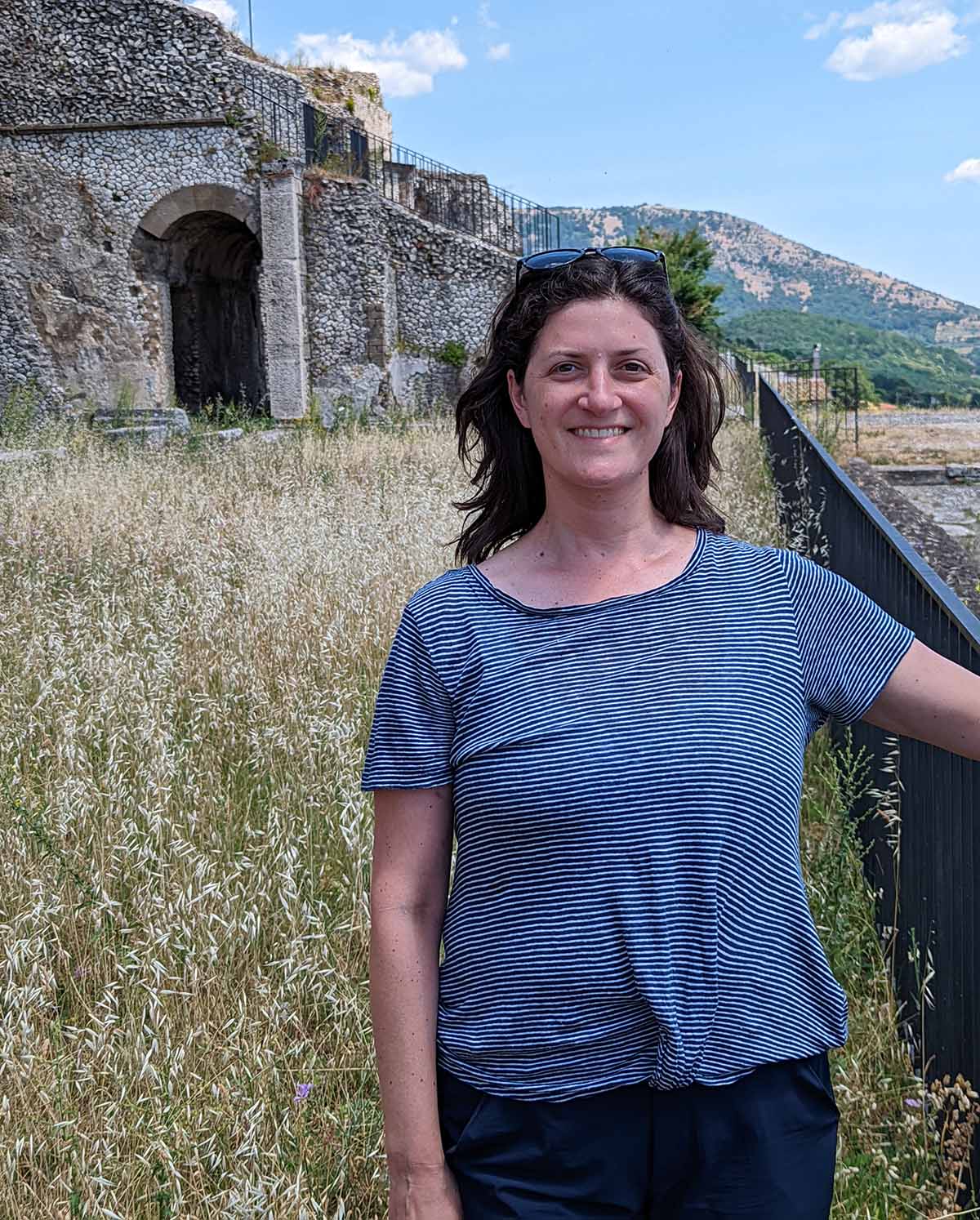
Rachel Meyers is Associate Professor of Classical Studies at Iowa State University, where she has taught since 2006. She studied at the Centro in the Spring 1998 semester, received her BA from Yale University, and then earned her PhD in Classical Studies from Duke University. She has diverse interests in the material culture and social history of the ancient Roman world. Her research is focused on the roles and representations of women and gender in the Roman world as well as on portrayals of the imperial family and tools of propaganda. Using an array of evidence encompassing marble portraits and statues, coinage, architectural monuments, written documents, and inscriptions, she explores the practice of philanthropic activity in Roman Hispania and across the Empire. Meyers regularly teaches courses on Latin, Mythology, Roman Archaeology, and Sex and Gender in the Ancient Mediterranean. She is a co-director of a summer study abroad program, bringing Iowa State students to Italy. She loves to travel and has explored ancient sites all around Italy, Greece, Turkey, and Spain.
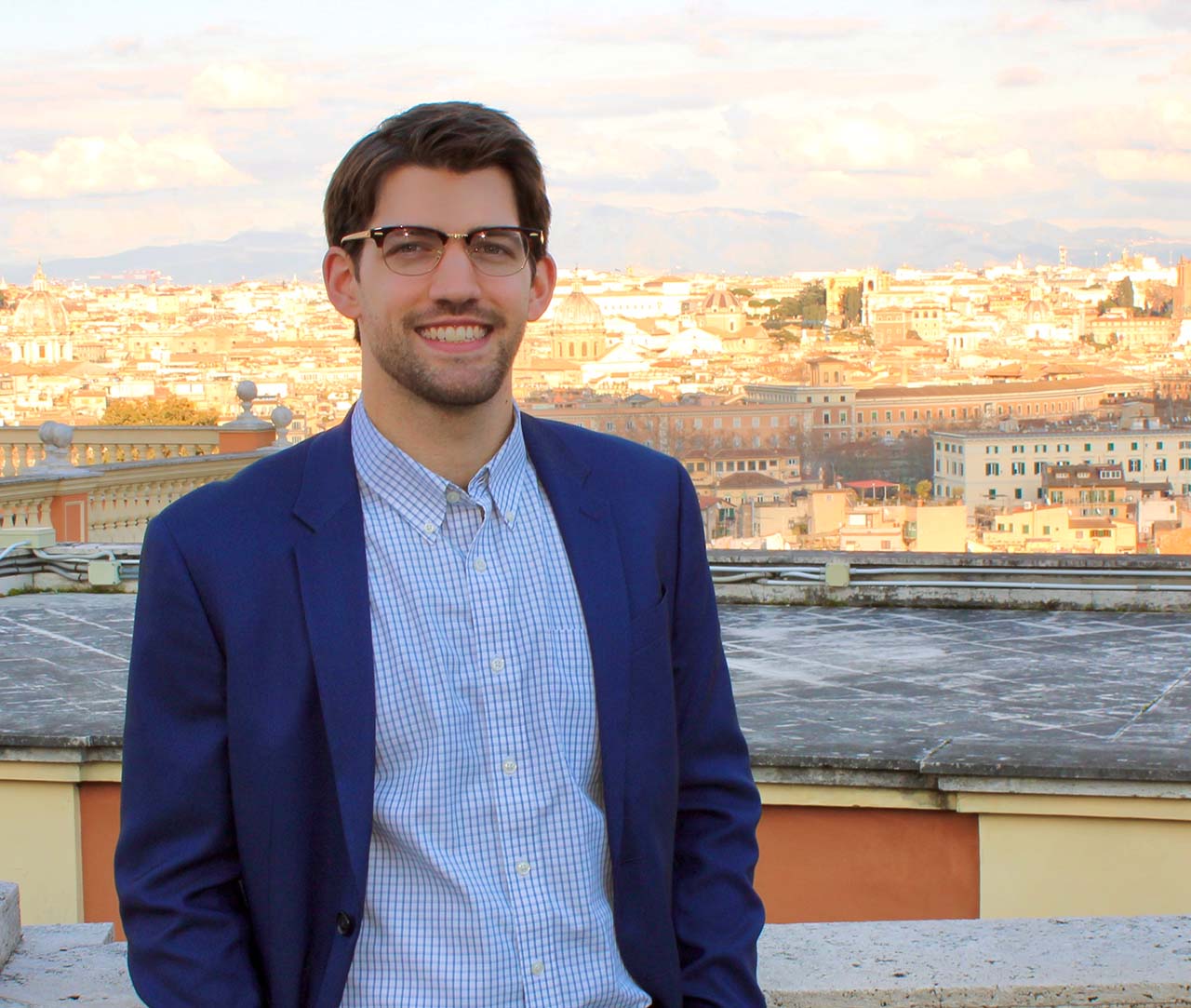
John Izzo studies Latin literature, ancient slavery, and classical reception. After earning a bachelor’s degree from Bowdoin College and a master’s degree from the University of Notre Dame, John is currently completing his Ph.D. in Classics at Columbia University. Over the years, John has been the instructor of various Latin and Greek courses, but most recently, he has been appointed as a Core Curriculum Preceptor for Literature Humanities, a two-semester course for first-year students on ancient, medieval, and modern literature. Having spent a year in Italy as the recipient of the 2022 Millicent Mercer Johnsen Rome Prize at the American Academy in Rome, John is eager to return to the Gianicolo, resume his strolls around the city, and enjoy the delicious food of Italy.
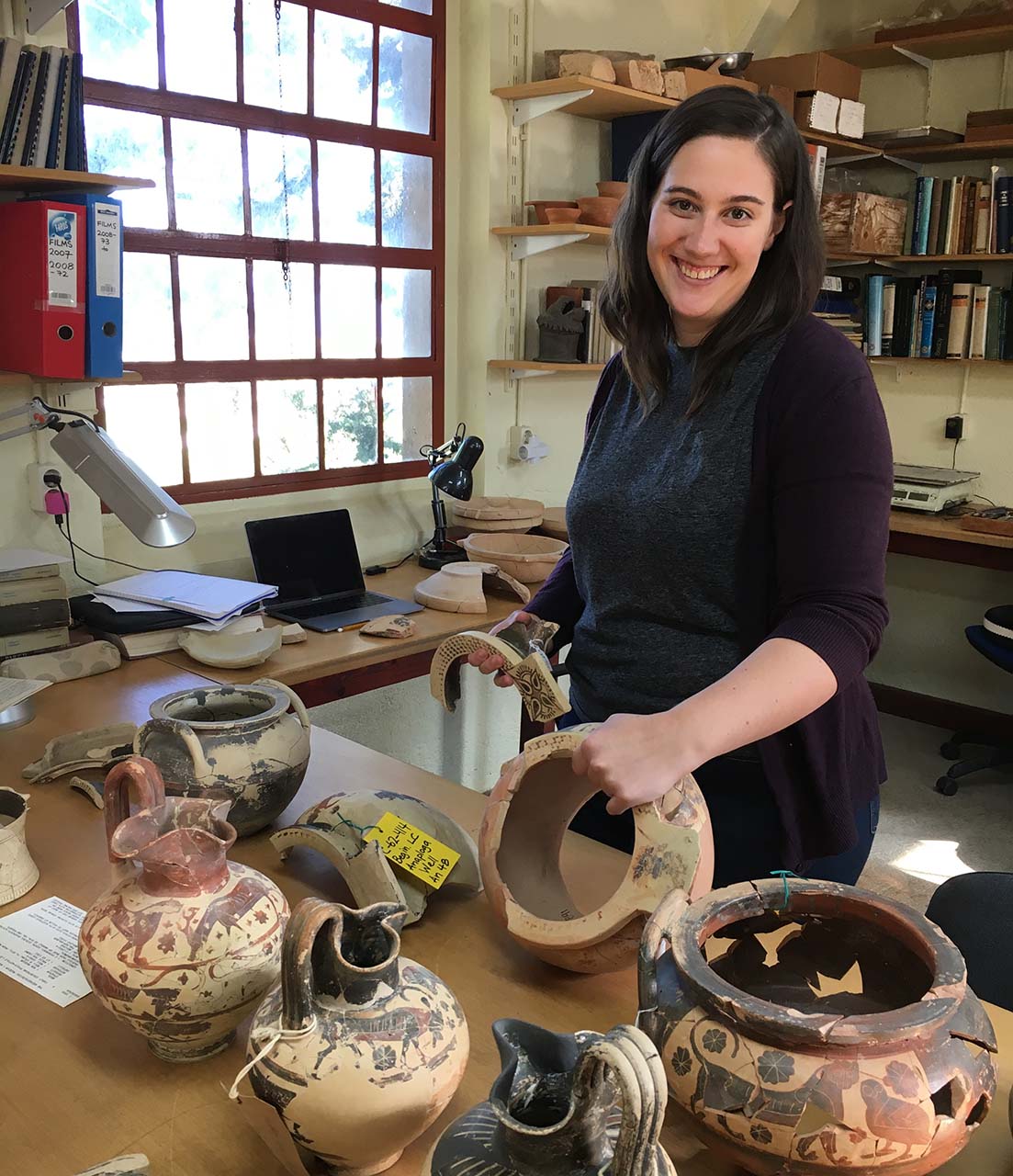
Haley Bertram is a Ph.D. candidate in Classical Archaeology at the University of Cincinnati. She studied abroad at the Centro in Spring 2012 on her way to a BA in Classics from Wellesley College, and then completed her MA in Classical Archaeology at the University of British Columbia. Haley’s research centers on the Archaic Mediterranean world, with a particular interest in the role of consumers in the development of craft production and style. She spent several years living in Greece and France as part of her dissertation research, which investigates the role of western Mediterranean markets in the development of Corinthian pottery from 750-500 BCE. Haley particularly enjoys teaching students how to “read” the material record, whether interpreting objects in their cultural context or discerning stratigraphic levels in the field. She is the Head Trench Supervisor at the Eastern Boeotia Archaeological Project (EBAP) in Boeotia, Greece, and has also participated in fieldwork in the Peloponnese (Corinth and Sikyon), Crete, and at the Iron Age site of Malvieu in southern France. In her free time next year, Haley is looking forward to wandering the various street markets of Rome, with pasticceria stops along the way.
Italian Language Instructor
Barbara Castaldo (Laurea, Università La Sapienza di Roma; M.A., Columbia University; Ph.D., New York University) is specialized in contemporary Italian literature with a doctoral thesis on Italian author Pier Paolo Pasolini (awarded Premio Pasolini in 2009). Her research interests include law and literature scholarship and comparative literature. She has published articles on contemporary Italian authors (Sandro Veronesi, Marco Lodoli, Ennio Flaiano, Pier Paolo Pasolini), and has appeared in a number of TV documentaries and radio interviews for Rai Storia (Italy), Arte TV (France-Germany), Österreich 1 (Austria). She is currently working on a book on Pier Paolo Pasolini’s legal trials. She has taught courses of Italian language at all levels and has been teaching Italian at ICCS since 2005.
Art History Instructor
Paul Tegmeyer began studying art history as an undergraduate at New Mexico State University in Las Cruces, New Mexico, where he was raised. After moving to Italy, actually l’Aquila, outside Rome, in 1983, he began graduate school at Temple University in Rome, and then Philadelphia. He later entered the Ph.D. program at the University of Pennsylvania. His area of specialization is the Italian Renaissance.
He began teaching the Renaissance. to Baroque Rome course at ICCS from 1990-92 and again from 1997 on. He also been teaching at John Cabot University in Rome since 1991. Here he has had the opportunity to expand his repertoire beyond the Italian Renaissance, teaching courses on Ancient and Medieval Rome, Baroque art, as well as monographic courses on Renaissance Rome; Raphael; Michelangelo; Bernini; et al. Since 1997 he has also conducted the Rome Seminar for the Smithsonian Institute.
His research focuses primarily on various aspects of Roman Renaissance art (Raphael, Pollaiuolo, Michelangelo, et al.). He is also now in the early stages of preparing with other colleagues, a “Guide to Renaissance Rome”.
Cultural Heritage Instructor

Roberto Nardi gained a degree in archaeology from the University of Rome La Sapienza in 1982, and a degree in conservation of archaeological materials and structures at ICR – Istituto Centrale per il Restauro, where he specialized in stone conservation in 1982.
In the same year, he founded the Centro di Conservazione Archeologica (CCA), a private company operating on public commission in the field of conservation of ancient monuments and archaeological sites, including professional training in conservation.
He has directed over 50 projects in 10 countries, on monuments and sites such as the Arch of Septimius Severus and the Temple of Vespasian in the Roman Forum, the Roman town of Zeugma, Turkey, the mural paintings of the Madrasa Amiriya in Yemen, and the mosaics of Saint Catherine in Sinai. Roberto has published over 80 technical articles, being co-editor of 7 volumes on conservation.
He is President of the ICCM, International Committee for the Conservation of Mosaics and member of ICOM, International Council of Museums – Committee for Conservation. He was Kress Lecturer at the American Institute of Archaeology for the academic years 2010/2011.
Intercollegiate Center for Classical Studies
Via A. Algardi, 19 00152 Roma, Italia
Tel 06-58.17.036 • Fax 06-58.09.306
Info@TheCentroRome.org
© Copyright 2021 – ICCS
